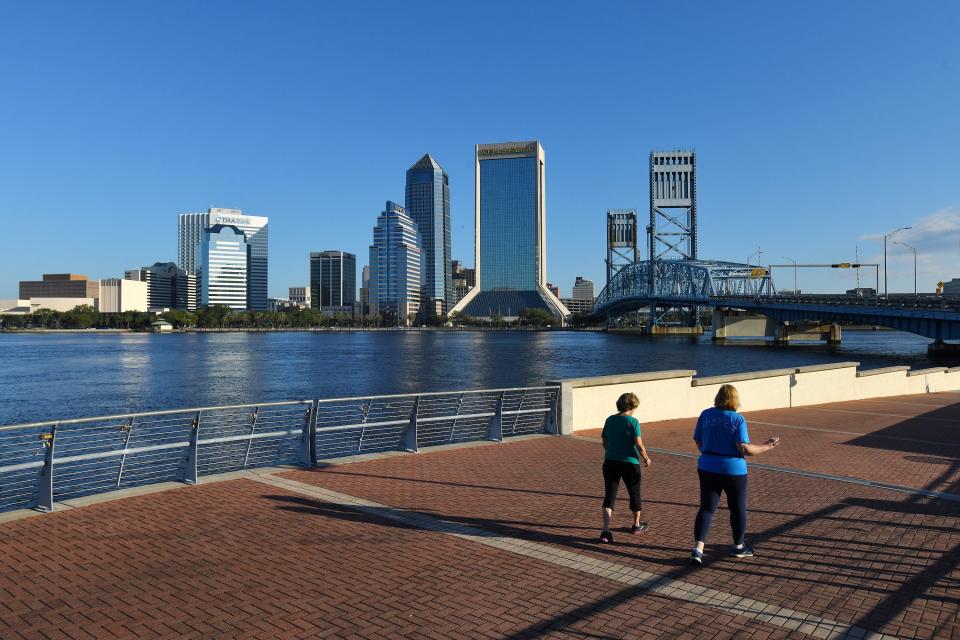How did once smelly Jacksonville area fare in annual State of the Air pollution report
For the third year in a row, the Jacksonville metropolitan area was named one of the cleanest in the nation, with an "A" grade for ozone pollution, according to an American Lung Association report.
The metropolitan area, which extends to St. Marys, Ga., and Palatka, had a "B" grade for short-term spikes in particle pollution. Still, that ranking — based on the area’s average number of unhealthy days — was better than last year's level, according to the report.
The State of the Air report ranks communities across the nation for "exposure to unhealthy levels of ground-level ozone air pollution, annual particle pollution and short-term spikes in particle pollution over a three-year period," according to the association This year’s 25th annual report includes 2020 through 2022 air quality data and the latest U.S. Environmental Protection Agency particle pollution standard.
Ozone and particle pollution can cause asthma attacks, heart attacks, strokes, preterm births and impaired cognitive functioning later in life, as well as premature death. Particle pollution can also cause lung cancer, according to the association.
"We have seen incredible improvement in the nation’s air quality," said Ashley Lyerly, the association's senior director of advocacy. "Unfortunately, more than 131 million people still live in places with unhealthy levels of air pollution. Climate change is making air pollution more likely to form and more difficult to clean up."

What is ozone and how have the Jacksonville area's levels improved?
Ozone is a gas molecule. The ozone layer in the earth's upper atmosphere "shields us from much of the sun's ultraviolet radiation. However, ozone air pollution at ground level … aggressively attacks lung tissue by reacting chemically with it," according to the association.
Ground-level ozone develops from pollution emitted from cars, power plants, industrial boilers, refineries and chemical plants and can also stem from paints, cleaners, solvents and motorized lawn equipment, according to the association.
Nationwide, ozone is the "air pollutant affecting the largest number of people," the association said.
The Jacksonville area received an "A" ozone grade because it had no unhealthy days. Only 24 years ago, in 2000, the city received an "F," with 15 days of bad ozone levels, tying for third-worst in Florida.
How did Jacksonville fare in short-term and long-term particle pollution rankings?
Particle pollution is a " mixture of solid particles and liquid droplets found in the air. Some particles, such as dust, dirt, soot or smoke, are large or dark enough to be seen with the naked eye," according to the EPA. "Others are so small they can only be detected using an electron microscope."
Such pollution can come from a variety of sources, including construction sites, unpaved roads, fields, smokestacks or fires. Most particles "form in the atmosphere as a result of complex reactions of chemicals such as sulfur dioxide and nitrogen oxides, which are pollutants emitted from power plants, industries and automobiles," according to the EPA.
From 2023: Jacksonville air quality slips as smoke from Canadian fires spreads; no advisories needed
The Jacksonville metro area ranked 124th worst in the nation for short-term particle pollution, with 0.3 unhealthy days per year, a "B” grade. Last year, the area was 118th worst. As for the year-round average of long-term particle pollution, the area received a passing grade and was 84th worst in the nation, compared to last year's 89th worst ranking.
Jacksonville has overcome its past reputation as a smelly, polluted city?
Yes. The American Lung Association's Lyerly has said Jacksonville had a "historical" reputation as one of the "most-polluted" cities in the country. But in recent years, the city "is one of the cleanest communities for ozone," she said, and has improved its particle pollution.
"In February 1949, soot from Jacksonville smokestacks was blamed for women’s nylon hosiery dissolving on their legs, a spectacle that made national news and fueled some of the first research into the city’s air pollution," according to a 2022 Times-Union report.
Air pollution complaints stirred objections to smells from paper mills and other factories, according to the Times-Union report.
What U.S. populations are the most affected by air pollution?

"Communities of color are disproportionately exposed to unhealthy air and are also more likely to be living with one or more chronic conditions that make them more vulnerable to air pollution," such as asthma, diabetes and heart disease, according to the association.
"A person of color in the U.S. is more than twice as likely as a white individual to live in a community with a failing grade on all three pollution measures," the association said.
What actions are needed to further improve U.S. air pollution?
The association attributes the improvement in Jacksonville and across the country to the Clean Air Act of 1970, which regulated air emissions from stationary and mobile sources and authorized the EPA to establish national air quality standards.
But climate change can worsen air pollution by creating "conditions, including heat and stagnant air, which … make ozone more likely to form. Even with current measures to reduce ozone, evidence warns that climate change will likely increase ozone levels in large parts of the U.S.," according to the association.
Newly enacted EPA air pollution rules "will help clean up particle pollution and address climate change," according to the association. But the nonprofit is also seeking what it called "long overdue stronger national limits on ozone pollution."
"Stronger limits would help people protect themselves and drive cleanup of polluting sources across the country," according to the association.
The association also advocates moving from fossil-fuel-fired power plants to non-combustion, renewable energy; reducing pollution, including methane emissions, at oil and gas drilling operations; improving energy efficiency; and using zero-emission transportation.
bcravey@jacksonville.com, (904) 359-4109
This article originally appeared on Florida Times-Union: Jacksonville, nation show improvement in State of the Air report

